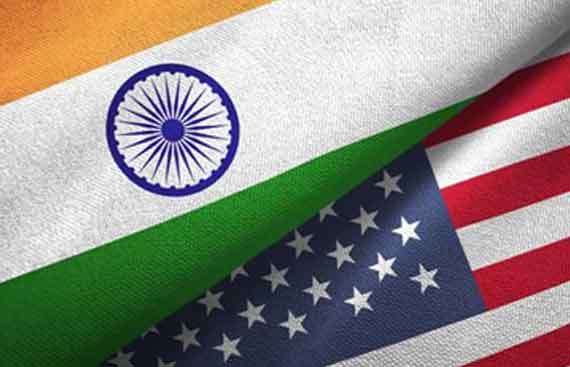Strengthening US-India Defense and Indo-Pacific Cooperation

The U.S. Indo-Pacific Command aims to prevent conflict in the Indo-Pacific region through diplomacy, military, and economic measures. Strong US-India partnerships, defense agreements, and Quad collaboration emphasize regional stability.
The primary goal of the US Indo-Pacific Command, led by ADM. John Aquilini, USN, is to prevent a conflict in the Indi-Pacific region through deterrence. This strategy relies on the comprehensive approach of involving diplomacy, information, military, and economic foreign policy measures from the entire US government to fulfill this mission. This command, known as INDOPACOM, is working to build stronger partnerships in the Indo-Pacific region to safeguard an international system that relies on rules and promotes stability and economic well-being globally.
India is becoming a significant partner of the US in the Asia-Pacific region, alongside its five treaty allies: Korea, Australia, Japan, the Philippines, and Thailand. This progress has been underscored by David Ranz, INDOPACOM senior foreign policy advisor, who has maintained a significant partnership with India in the last five years. He has occupied various official positions, including his service as the United States consul general in Mumbai and as the deputy assistant secretary of state for the South Asia region, encompassing countries like India, Bangladesh, Nepal, Sri Lanka, Bhutan, and the Maldives.
There are several reasons for the strengthening ties between the United States and India. Firstly, India is seen as a potential leader in the Indo-Pacific region and on a global scale due to its military and economic capabilities. Additionally, India is currently the country with the largest population in the world. Furthermore, the United States and India share the distinction of being the oldest and largest democracies globally, which creates natural affinities between the two nations.
As per the aforementioned results, the US is collaborating with India across all sectors and areas of cooperation. Emphasizing the remarkable pace and growth of their relationship across all domains, the recent visit of India's PM Narendra Modi to Washington was noted, highlighting the extensive agreements reached during that visit. Furthermore, it was mentioned that President Joe Biden traveled to Delhi for the G20 summit, further underscoring the significance of the United States' engagement with India.
The recent high-level visits between the US and India have led to efforts to strengthen their major Defence partnership through increased collaboration in various areas such as space and AI.
A notable instance of this collaboration is the agreement between the US and India for GE Aerospace to manufacture fighter jet engines for the Indian Air Force's Tejas Mk2 aircraft. The White House described this arrangement as an unprecedented co-production and technology transfer proposal, while the head of GE and GE Aerospace called it a historic agreement that will enhance defense cooperation between the two countries.
In addition, it was announced that Indis acquired 31 US MQ-9B Reapers from general atomics, compromising 16 SkyGuardian and 15 SeaGuardian variants of remotely piloted aircraft along with related equipment, as stated by the White House. Given the extensive intelligence, surveillance, and reconnaissance capabilities of these unmanned aerial vehicles, the move was seen as a significant step in enhancing cooperation between the United States and India, particularly in the area of maritime domain awareness.
Officials from the United States and India met to discuss progress on the Roadmap for U.S.-India Defense Industrial Cooperation and the initiation of co-production projects involving companies like GE. They explored ways to improve interoperability and logistics cooperation, particularly through joint maritime engagements in the Indian Ocean region. Additionally, they discussed expanded collaboration in the space and cyber domains. The officials engaged in discussions concerning regional security developments and strategic priorities in the Indo-Pacific region.
The primary focus of the Quads' programming is non-security and non-military. However, there is a security-oriented initiative known as the Indo-Pacific Partnership for Maritime Domain Awareness Initiative, where the Quads collaborate to share unclassified commercially available maritime domain awareness information with their partners and allies in the Indo-Pacific region.
India is taking the lead for South Asia, the United States for Southeast Asia, and Australia for the Pacific. India, due to its extensive maritime presence and long borders in the Indian Ocean, is particularly interested in expanding its maritime domain awareness capabilities. The activities of the Quad nations, which comprise the Quadrilateral Security Dialogue involving India, Australia, Japan, and the United States, continue to be significant to INDOPACOM. Notably, India is slated to host the Quad Nations' meeting in 2024, as reported by the White House.
The U.S. Indo-Pacific Command focuses on preventing conflict in the Indo-Pacific region through a comprehensive approach that involves diplomacy, information, military, and economic measures. The strengthening partnership between the United States and India is a key aspect of their strategy, driven by shared values, India's potential leadership role, and collaborative efforts in various sectors, including defense.
High-level visits have resulted in significant defense agreements, including the co-production of fighter jet engines and the acquisition of advanced unmanned aerial vehicles. The Quad nations' collaboration, with a focus on maritime domain awareness, plays a crucial role in addressing regional challenges. This strategic cooperation underscores the importance of stability and rules in the Indo-Pacific region.
